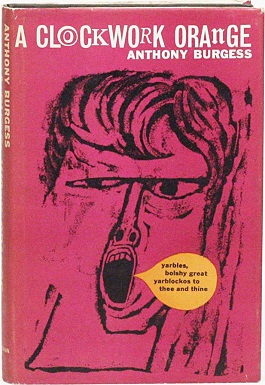A Clockwork Orange (novel)
A Clockwork Orange is a dystopian novel by Anthony Burgess, published in 1962. The novel is set in a near-future society that features a subculture of extreme youth violence. It explores themes of free will, the nature of evil, and the possibility of redemption.
Plot summary[edit | edit source]
The story is narrated by Alex, a 15-year-old delinquent who leads a small gang of "droogs"—Pete, Georgie, and Dim. They engage in acts of "ultraviolence," including robbery, rape, and assault. The novel opens with Alex and his droogs at the Korova Milkbar, planning their evening of mayhem.
After a series of violent escapades, Alex is betrayed by his droogs and arrested. In prison, he volunteers for an experimental treatment called the "Ludovico Technique," which is designed to condition him against violence. The treatment is successful, but it leaves Alex unable to defend himself or enjoy music, which he loves.
Upon release, Alex finds himself alienated from society and unable to reintegrate. He is attacked by former victims and eventually attempts suicide. In the final chapter, Alex begins to mature and considers a future with a family, suggesting a potential for change and growth.
Themes[edit | edit source]
A Clockwork Orange explores several themes:
- Free Will and Morality: The novel questions whether it is better to choose to be bad than to be forced to be good. The Ludovico Technique removes Alex's ability to choose, raising ethical questions about free will.
- The Nature of Evil: Alex's violent behavior is depicted as a natural part of his character, challenging the reader to consider the nature of evil and whether it can be eradicated.
- Youth and Rebellion: The novel portrays a society in which youth culture is defined by rebellion and violence, reflecting concerns about juvenile delinquency and societal breakdown.
- Government Control and Oppression: The state's use of the Ludovico Technique represents a form of totalitarian control, highlighting the dangers of government overreach.
Language[edit | edit source]
Burgess invented a fictional slang called "Nadsat" for the novel, a mix of Russian, English, and Cockney rhyming slang. This language serves to immerse the reader in Alex's world and to distance them from the violence described.
Adaptations[edit | edit source]
A Clockwork Orange has been adapted into various media, most notably the 1971 film directed by Stanley Kubrick. The film is known for its stylized depiction of violence and its faithful adaptation of the novel's themes.
Cultural Impact[edit | edit source]
The novel has had a significant impact on popular culture, influencing music, film, and literature. Its exploration of free will and morality continues to resonate with audiences, and its unique language has entered the cultural lexicon.
Related pages[edit | edit source]
See also[edit | edit source]
Search WikiMD
Ad.Tired of being Overweight? Try W8MD's physician weight loss program.
Semaglutide (Ozempic / Wegovy and Tirzepatide (Mounjaro / Zepbound) available.
Advertise on WikiMD
|
WikiMD's Wellness Encyclopedia |
| Let Food Be Thy Medicine Medicine Thy Food - Hippocrates |
Translate this page: - East Asian
中文,
日本,
한국어,
South Asian
हिन्दी,
தமிழ்,
తెలుగు,
Urdu,
ಕನ್ನಡ,
Southeast Asian
Indonesian,
Vietnamese,
Thai,
မြန်မာဘာသာ,
বাংলা
European
español,
Deutsch,
français,
Greek,
português do Brasil,
polski,
română,
русский,
Nederlands,
norsk,
svenska,
suomi,
Italian
Middle Eastern & African
عربى,
Turkish,
Persian,
Hebrew,
Afrikaans,
isiZulu,
Kiswahili,
Other
Bulgarian,
Hungarian,
Czech,
Swedish,
മലയാളം,
मराठी,
ਪੰਜਾਬੀ,
ગુજરાતી,
Portuguese,
Ukrainian
Medical Disclaimer: WikiMD is not a substitute for professional medical advice. The information on WikiMD is provided as an information resource only, may be incorrect, outdated or misleading, and is not to be used or relied on for any diagnostic or treatment purposes. Please consult your health care provider before making any healthcare decisions or for guidance about a specific medical condition. WikiMD expressly disclaims responsibility, and shall have no liability, for any damages, loss, injury, or liability whatsoever suffered as a result of your reliance on the information contained in this site. By visiting this site you agree to the foregoing terms and conditions, which may from time to time be changed or supplemented by WikiMD. If you do not agree to the foregoing terms and conditions, you should not enter or use this site. See full disclaimer.
Credits:Most images are courtesy of Wikimedia commons, and templates, categories Wikipedia, licensed under CC BY SA or similar.
Contributors: Prab R. Tumpati, MD




